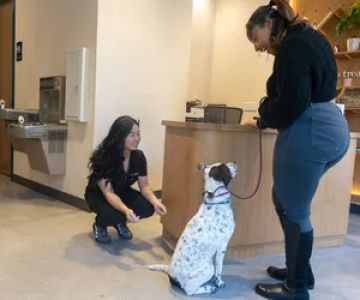Can You Become a Veterinarian After Earning a Pharmacy Degree?
Many individuals who pursue careers in healthcare start by earning degrees in one field, only to later discover a passion for another. If you have a pharmacy degree and have always dreamed of becoming a veterinarian, you might be wondering if this career transition is even possible. The good news is that it’s certainly feasible! However, it’s not a simple process, and there are some important steps and considerations to take into account. In this article, I will explore the journey of transitioning from a pharmacy background to a veterinary career, covering everything from the necessary education and qualifications to the challenges and benefits of making such a change.
- 1. Understanding the Path from Pharmacy to Veterinary Medicine
- 2. Can Your Pharmacy Degree Help in Veterinary School?
- 3. The Necessary Classes and Additional Requirements
- 4. Gaining Experience in Veterinary Medicine
- 5. The Application Process for Veterinary School
- 6. The Challenges and Rewards of Switching Careers
1. Understanding the Path from Pharmacy to Veterinary Medicine
As someone who has worked in the pharmacy field for several years, I understand the appeal of wanting to switch careers to become a veterinarian. Both professions require a deep passion for helping others—whether that’s humans or animals—and a strong understanding of medical science. The good news is that having a pharmacy degree can be an advantage in veterinary school. Pharmacists already have a solid foundation in drug administration, biology, and healthcare principles, which can make certain aspects of veterinary education easier to grasp. However, there are also significant differences between the two fields, and transitioning from pharmacy to veterinary medicine will require additional schooling and preparation.
In terms of practicality, most veterinary schools have specific prerequisites that applicants must meet, including certain undergraduate courses and volunteer experience working with animals. While a pharmacy degree won’t automatically give you a direct entry into veterinary school, it provides a valuable scientific foundation that may make it easier for you to adapt to veterinary studies. The real challenge, however, lies in gaining the necessary hands-on experience with animals and fulfilling the specific veterinary school requirements.
2. Can Your Pharmacy Degree Help in Veterinary School?
One of the questions I had when considering this career switch was whether my pharmacy degree would provide any advantages in veterinary school. The answer is yes, but it’s important to understand how. As a pharmacist, you already have a strong understanding of pharmacology, anatomy, and medical terminology, which are all essential to veterinary practice. These foundational skills will undoubtedly help you in courses that involve drug management, anesthesia, and clinical pharmacology in veterinary medicine.
However, while a pharmacy degree gives you an edge in understanding medical practices, veterinary medicine also requires knowledge of animal care, physiology, and surgery, which are areas that differ significantly from human medicine. Even though you may have a solid medical foundation, you’ll still need to catch up on specific veterinary-related coursework, such as animal behavior, animal husbandry, and veterinary surgery techniques.
3. The Necessary Classes and Additional Requirements
Before applying to veterinary school, you’ll need to ensure that you meet the prerequisites. As a pharmacy graduate, you likely already have a good portion of the necessary science courses, but there will still be some additional classes you’ll need to take. Here’s a breakdown of the typical coursework required for veterinary school:
3.1. Required Undergraduate Courses
Most veterinary schools require applicants to have completed courses in biology, chemistry, physics, and animal science. While some of these courses may overlap with your pharmacy degree, you may need to take additional classes in areas like genetics, microbiology, and animal biology. I found that many veterinary programs expect a strong foundation in these areas to prepare students for the challenges they will face in veterinary studies.
3.2. Animal Experience
One area where pharmacy graduates often need to catch up is gaining direct experience with animals. Veterinary schools generally require applicants to have significant hands-on experience working with animals, such as volunteering at animal shelters, clinics, or farms. This experience is crucial for developing the necessary skills and understanding animal behavior, which will be critical in your veterinary studies and practice.
3.3. Volunteering or Shadowing
During my transition into veterinary studies, I volunteered at local veterinary clinics and animal shelters to gain exposure to the field. This experience was invaluable, as it helped me better understand the daily responsibilities of veterinarians and allowed me to develop skills in animal handling, diagnostics, and client interaction. Some veterinary schools may also require a set number of volunteer hours as part of their admission criteria, so it's important to start gaining experience as early as possible.
4. Gaining Experience in Veterinary Medicine
Aside from completing the necessary classes, gaining hands-on experience is one of the most important aspects of transitioning from a pharmacy career to veterinary medicine. As a pharmacy professional, you’re already familiar with patient care and the medical field, but veterinary practice requires a unique set of skills when it comes to working with animals. I recommend finding opportunities to shadow veterinarians or volunteer in settings where you can interact with different species and learn more about animal care.
For example, I shadowed veterinarians at a local animal hospital to gain insight into surgeries, diagnostic procedures, and treatment plans. This experience not only enhanced my understanding of the field but also allowed me to form connections with professionals who provided valuable advice and mentorship. Additionally, some veterinary programs offer internships or externships, which can provide structured opportunities to gain practical experience and increase your chances of acceptance into veterinary school.
5. The Application Process for Veterinary School
Once you’ve completed your undergraduate courses, gained enough experience, and fulfilled the prerequisites, you’ll be ready to apply to veterinary school. The application process can be competitive, and it’s important to have a strong application that highlights both your academic achievements and your hands-on experience with animals. Veterinary schools often require letters of recommendation from professors or veterinarians, so it’s essential to build relationships with individuals who can speak to your dedication and passion for animal care.
Additionally, many veterinary schools require standardized tests, such as the GRE or the VCAT, as part of their admission process. These tests assess your knowledge in areas such as biology, chemistry, and general reasoning. Preparing for these exams early can give you a better chance of scoring well and improving your application.
6. The Challenges and Rewards of Switching Careers
While the process of becoming a veterinarian after earning a pharmacy degree may seem challenging, it’s important to remember that the journey is not only rewarding but also worth the effort. For me, the transition was difficult at times, but it allowed me to combine my medical knowledge with my passion for animals. The challenges, such as additional coursework and gaining hands-on experience, were ultimately outweighed by the fulfillment I found in pursuing a career I truly loved.
Additionally, the veterinary field offers a wide range of career options, from clinical practice to research, education, and animal welfare. Whether you decide to specialize in a specific type of animal care or pursue a more general veterinary career, the opportunities are vast and diverse. The skills you bring from your pharmacy background—particularly in pharmacology and medical management—can help you stand out as a veterinary professional.
If you’re serious about making the switch from pharmacy to veterinary medicine, I recommend researching veterinary schools and reaching out to admissions offices for guidance on specific requirements. Websites like Scent Snob can help connect you with relevant resources and advice to support your journey from pharmacy to veterinary school.











